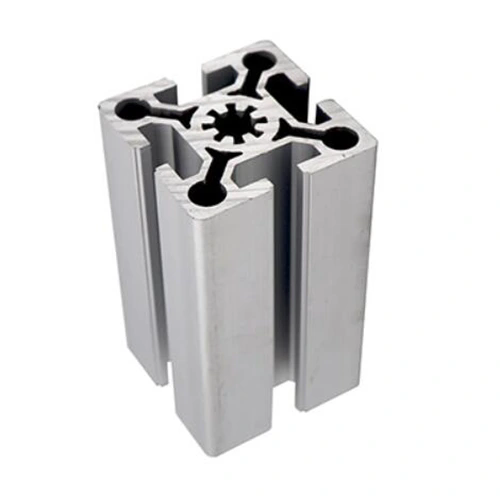Advantages of Aluminum Extrusion
2024-06-12
Aluminum extrusion is a manufacturing process used to create complex shapes and profiles by forcing aluminum alloy through a die with a specific cross-sectional profile. This process is widely used in various industries due to the versatility, strength, and lightweight properties of aluminum. Here's an overview of aluminum extrusion:
Process of Aluminum Extrusion
1. Billet Preparation:
- The process begins with the preparation of aluminum billets, which are typically cylindrical or rectangular blocks of aluminum alloy. The billets are heated to a specific temperature to soften the metal and make it more malleable for extrusion.
2. Extrusion:
- The heated aluminum billet is loaded into the extrusion press, where it is forced through a shaped die under high pressure. The die imparts the desired cross-sectional profile to the aluminum as it passes through.
3. Cooling and Quenching:
- After extrusion, the newly formed aluminum profile is rapidly cooled and quenched using water or air to help set its shape and properties.
4. Stretching and Straightening:
- Some extruded aluminum profiles may undergo stretching or straightening processes to achieve the desired dimensions, straightness, and mechanical properties.
5. Cutting and Finishing:
- The extruded aluminum profiles are cut to the desired length using saws or shears. Additional finishing processes such as machining, surface treatment, anodizing, or painting may be performed to enhance the appearance and performance of the profiles.
Advantages of Aluminum Extrusion
1. Versatility:
- Aluminum extrusion allows for the creation of a wide range of complex shapes and profiles, including hollow and solid sections, with precise dimensional control.
2. Lightweight:
- Aluminum is lightweight yet durable, making extruded aluminum profiles suitable for applications where weight reduction is desired, such as automotive, aerospace, and transportation industries.
3. Strength-to-Weight Ratio:
- Aluminum extrusions offer an excellent strength-to-weight ratio, providing high strength and rigidity while minimizing material usage and overall weight.
4. Corrosion Resistance:
- Aluminum naturally forms a protective oxide layer that provides excellent corrosion resistance, making extruded aluminum profiles suitable for outdoor and marine applications.
5. Thermal Conductivity:
- Aluminum has excellent thermal conductivity, allowing for efficient heat transfer and dissipation. Extruded aluminum heat sinks are commonly used in electronics and thermal management applications.
6. Recyclability:
- Aluminum is highly recyclable, and extruded aluminum profiles can be recycled and reused with minimal loss of properties, making them environmentally friendly and sustainable.
Applications of Aluminum Extrusion
1. Construction and Architecture:
- Extruded aluminum profiles are widely used in building and construction for window and door frames, curtain walls, structural components, and architectural trim.
2. Transportation:
- Aluminum extrusions are used in the automotive, aerospace, and railway industries for body structures, chassis components, interior trim, and lightweight structural elements.
3. Electronics and Electrical:
- Aluminum heat sinks, enclosures, and structural components are used in electronics, electrical equipment, and power transmission systems to dissipate heat and provide structural support.
4. Consumer Goods:
- Extruded aluminum profiles are used in a variety of consumer products, including furniture, lighting fixtures, appliances, and sporting goods, due to their aesthetic appeal, durability, and lightweight properties.
5. Industrial and Manufacturing:
- Aluminum extrusions find applications in industrial machinery, material handling equipment, conveyor systems, and custom fabricated components due to their versatility, strength, and ease of machining.
Conclusion
Aluminum extrusion is a versatile manufacturing process used to create a wide range of complex shapes and profiles from aluminum alloy. With its lightweight, strength, corrosion resistance, and recyclability, extruded aluminum profiles find applications across various industries, including construction, transportation, electronics, consumer goods, and industrial manufacturing. The ability to produce custom-designed profiles with precise dimensional control makes aluminum extrusion a cost-effective and efficient solution for diverse engineering and design requirements.



